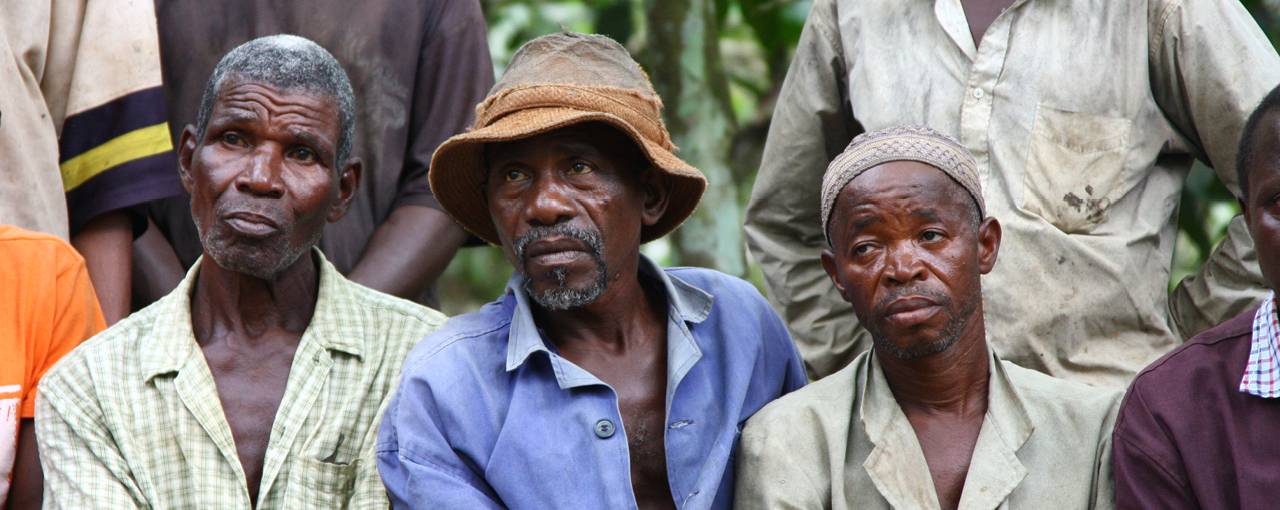Training and Coaching
A combination of training and one-to-one coaching enables farmers to run professional and responsible farms
We know one of the best ways to improve the livelihoods of farmers and their communities is by improving farm productivity. But, at a time when they have the opportunity to increase the supply of cocoa to improve their livelihoods, farmers in many cocoa-growing regions are struggling to grow more. Smallholder farmers are particularly vulnerable to changes such as unfavorable weather or crop diseases. Helping them to access the skills, knowledge and tools they need to withstand such challenges and improve farm productivity is a key component of our sequential approach to improving farmer livelihoods.
Why training and coaching is important
Cocoa productivity depends on the conditions on a farm, such as nutrients in the soil and shade provided to a cocoa tree, as well as use of high-quality planting material, appropriate use of fertilizer and crop protection. But farmers often lack access to crop protection products, fertilizer and other agricultural resources. And, even when they do have access, many farmers lack the skills required to use them effectively.
Applying Good Agricultural Practices (GAP), proven health & safety procedures, and effective business practices are integral to running professional and responsible farms. This is why we invest in farmers’ capacity through Farmer Field Schools. Our training teaches farmers the techniques and practices they need to improve the agricultural practices on their farms, run them as profitable businesses, and play a positive role in their communities.
From farmer training to individual coaching
In recent years we have found that, while farmer training improves knowledge on good agricultural practices, it has not always led to the effective adoption of practices on the farm. To address this, we are moving progressively towards individual farmer coaching rather than farmer training in groups and classrooms. One-to-one coaching takes place on the farm and is an ongoing process that spans assessment of the individual farmer and their farm, training and guidance, through to planning of activities and monitoring of adoption and outcomes.
We began piloting farmer coaching in Côte d’Ivoire in 2016 (see case study). Together with the ICRAF, the World Agroforestry Centre, we have trained around 1,250 farmers to deliver farmer coaching. Each one of these farmers coaches around 60 farmers per year. First, they visit the farmer and undertake a detailed farm assessment that they use to create a bespoke Farm Development Plan. The farmer is revisited annually to check progress on delivering their plan and monitor the outcomes they are achieving. Through coaching, we get detailed insights at the farmer, coop and regional level, which help us to direct supply of inputs and subject-related training to where it is needed most.
Progress and highlights
3,199 Farmer Field Schools set up across our five origin countries (up from 2,700 in 2015), providing training to 145,064 farmers (90,000 in 2015)
62,000 farmers in Côte d’Ivoire have benefited from one-to-one coaching through which they have developed farm development plans
145,064 cocoa farmers trained in Good Agricultural Practices, the majority in Côte d'Ivoire (71,673), Ghana (24,507) Cameroon (30,000), Indonesia (18,784) and Brazil (100)
49% average yield increases among cocoa farmers who adopted the year one actions set out in farm development plans in 2016
Looking ahead
In 2017, we launched a new project to pilot the farmer coaching model in Cameroon and we are exploring opportunities to introduce it in Ghana (see case study).
45% more farmers will be reached through our coaching program, including 4,500 farmers in Ghana and a new pilot in Cameroon by 2017/2018
30,000 more farmers will receive training and support to achieve certification globally beyond 2018

